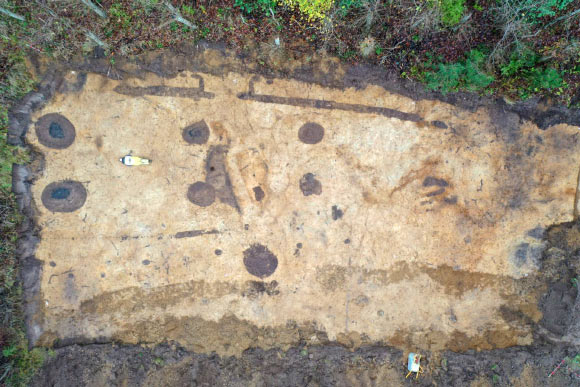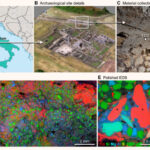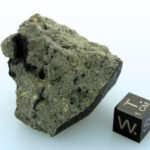Archaeologists from Nordjyske Museer have unearthed the remains of a Viking-age structure near the village of Hune in Denmark.
The newly-discovered Viking hall was up to 40 m (131 feet) long and 8-10 m (26-33 feet) wide.
The building had 10-12 oak posts that supported the roof. The posts were rectangular in cross-section and measured up to 50 by 90 cm (20-35 inches).
“This is the largest Viking Age find of this nature in more than 10 years, and we have not seen anything like it before here in North Jutland, even though it has only been partially excavated,” said Dr. Thomas Rune Knudsen, an archaeologist with Nordjyske Museer.
“And it’s not just a slightly larger house than average, because the hall has been a prestigious building which, in addition to having a more everyday function, has probably also been a gathering place for political meetings and large Viking guilds.”
“In its design, the long hall is reminiscent of the houses found at Harald Bluetooth’s ring castles, which include Fyrkat at Hobro and Aggersborg at Aggersund, and for this reason, among other things, the hall can tentatively be dated to the late Viking Age, i.e. last half of the 9th century CE or the very first part of the 11th century CE.”

A reconstruction of a Viking house from the ring castle Fyrkat near Hobro, Denmark. Image credit: Malene Thyssen / CC BY-SA 3.0.
“We only had the opportunity to excavate part of the hall, but there are probably several houses hidden under the ground to the east,” Dr. Knudsen said.
“A hall building of this nature rarely stands alone.”
“There may have been one of the Viking nobleman’s farms here, which was inhabited by one of the area’s important and powerful families.”
“But the story does not end here, because in fact we can name this family with some probability.”
“In the area near Hune, we know of a rune stone which can be dated to this particular period.”
“The 1.5-m- (5-foot) high stone stands in Hune Kirke not far from the excavation and bears the text: ‘Hove, Thorkild, Thorbjørn set their father Runulv den Rådnilde’s stone.’ It is dated to 970-1020 CE.”
“Although we do not know its original location, we do know that it originates from the local area,” Dr. Knudsen said.
“It is difficult to prove that the found Viking hall belonged to the family of Runulv den Rådsnilde, but it is certainly a possibility.”
“If nothing else, the rune stone and hall represent the same social class and both belong to society’s elite.”




